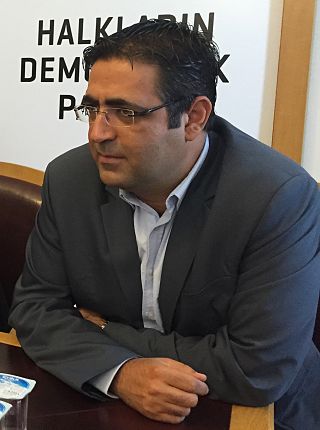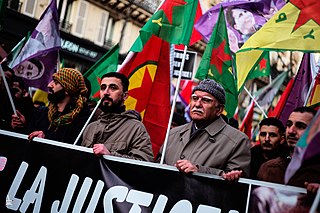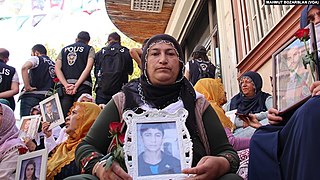Related Research Articles

Abdullah Öcalan, also known as Apo, is a political prisoner and founding member of the militant Kurdistan Workers' Party (PKK).

Feleknas Uca is a Turkish politician of Kurdish descent. From 1999 to 2009, she was member of the European Parliament from Germany, serving with Die Linke. Feleknas Uca was at one time the world's only Yazidi parliamentarian until the Iraqi legislature was elected in 2005. In June 2015, she was elected as a Member of Parliament in Turkey representing Diyarbakır.

Osman Baydemir is a Kurdish politician, lawyer and human rights activist. He was the mayor of his home town of Diyarbakır from 2004 to 2014. He was a member of the Grand National Assembly of Turkey for the Peace and Democracy Party (BDP) and also the Peoples Democratic Party (HDP).
Musa Anter, also known as "Apê Musa", was a Kurdish writer, journalist and intellectual. Anter was assassinated by Turkish JITEM in September 1992.
Ayla Akat Ata is a Kurdish–Turkish jurist and former member of the Grand National Assembly of Turkey of the Peace and Democracy Party (BDP). She is a women's rights activist and the co-founder of the Free Women's Congress (KJA). Besides she was also involved in the negotiations between the Kurdistan Workers' Party (PKK) and the Turkish Government in 2013.

This is the timeline of the Turkish-Kurdish conflict. The Kurdish insurgency is an armed conflict between the Republic of Turkey and various Kurdish insurgent groups, which have demanded separation from Turkey to create an independent Kurdistan, or to have autonomy and greater political and cultural rights for Kurds in Turkey. The main rebel group is the Kurdistan Workers' Party or PKK, which was founded on November 27, 1978, and started a full-scale insurgency on August 15, 1984, when it declared a Kurdish uprising. Apart from some extended ceasefires, the conflict has continued to the present day.
The Democracy Party was a pro-Kurdish political party in Turkey founded on the 7 May 1993.
The word serhildan describes several Kurdish protests and uprisings since the 1990s that used the slogan "Êdî Bese" ("Enough") against Turkey. Local shops are often closed on the day of demonstrations as a form of protest.

The Kurdistan Communities Union is a Kurdish political organization committed to implementing Abdullah Öcalan's ideology of democratic confederalism. The KCK also serves as an umbrella group for several confederalist political parties of Kurdistan, including the Kurdish militant political organization and armed guerrilla movement Kurdistan Workers' Party (PKK), Democratic Union Party (PYD), Kurdistan Free Life Party (PJAK), and Kurdistan Democratic Solution Party (PÇDK). Finland and Sweden's alleged support for the KCK, is one of the points which caused Turkey to oppose Finland and Sweden's NATO accession bid.
Akın Birdal is a Turkish human rights activist and politician. He was a member of the Grand National Assembly of Turkey for the Democratic Society Party (DTP) and the Peace and Democracy Party (BDP) from 2009 to 2011. He is an honorary President of the Human Rights Association of Turkey (IHD), having been its chair from 1992 to 1998. He has published a number of essays and short stories. He is married with two children.
The 2011–2012 Kurdish protests in Turkey were protests in Turkey, led by the Peace and Democracy Party (BDP), against restrictions of Kurdish rights by of the country's Kurdish minority's rights. Although they were the latest in a long series of protest actions by Kurds in Turkey, they were strongly influenced by the concurrent popular protests throughout the Middle East and North Africa, and the Turkish publication Hürriyet Daily News has suggested that the popularly dubbed "Arab Spring" that has seen revolutions in Egypt and Tunisia may lead to a "Kurdish Summer" in the northern reaches of the Middle East. Protesters have taken to the streets both in İstanbul and in southeast Turkey, with some demonstrations also reported as far west in Anatolia as İzmir.
Sakine Cansız was one of the co-founders of the Kurdistan Workers' Party (PKK). A Kurdish activist in the 1980s, she was arrested and tortured by Turkish police. A close associate of Abdullah Öcalan and a senior member of the PKK, she was shot dead during the triple murder of Kurdish activists in Paris, France, on 9 January 2013, along with two other female Kurdish activists, Fidan Doğan and Leyla Söylemez.

Fréderike Geerdink is a Dutch freelance journalist and author who specializes in reporting on Kurdish women and political issues in Turkey from Diyarbakir, where she was the lone foreign journalist based there between 2012 and 2015. She was twice arrested in Turkey and was deported on 9 September 2015. Following this, she spent one year embedded as a journalist with the Kurdistan Workers' Party.

İdris Baluken is a Turkish politician of Kurdish origin who currently serves as a parliamentary group leader of the Peoples' Democratic Party (HDP) since April 2014. He previously served as a parliamentary group leader for the Peace and Democracy Party (BDP) from 2012 until the party's MPs joined the HDP in April 2014.

Fidan Doğan, Sakine Cansiz and Leyla Şaylemez, Kurdish women's activists, were murdered by gunshots to the head during the night of 9–10 January 2013 in the 10th arrondissement of Paris.

The Mothers of Diyarbakır is a group of Kurdish mothers who gather daily for a sit-in protest against the Peoples' Democratic Party (HDP), demanding the return of their children who allegedly were deceived or kidnapped by the Kurdistan Workers' Party (PKK). The sit-in takes places outside the Diyarbakır headquarters of the HDP. In contrast to the Saturday Mothers in Istanbul, who also ask for the whereabouts of their relatives and whose protests face oppression from the police, the Mothers of Diyarbakır group are supported by the Turkish police who escort them home in the evenings, and are protected by the local state prosecutor. The pro-government media also support the group.
Kurdish-Turkish peace initiatives, there were several, since the conflict with the Kurdistan Workers' Party began in 1978. Some were successful, others not. But the first real approach to the Kurdish question in Turkey came after the Government of Turgut Özal decided to end the policy of denial of the Kurds and allow the Kurdish language to be spoken in 1991 and later on in the same year also to be broadcast.
Gurbetelli Ersöz was a chemist, journalist and later also member of the Kurdistan Workers' Party (PKK).

Yaşar Kaya was a Turkish-Kurdish politician and publisher of the pro-Kurdish newspaper Özgür Gündem. Together with authors like Ismail Besikçi and Musa Anter, he was a co-founders of the Kurdish Institute of Istanbul in 1992.
Kurdish Theatre is theatre including Kurdish themes and or the Kurdish language. Early figures in supporting the Kurdish theatre can be seen in Mehdi Zana from Diyarbakir and the Theatre Companies in Istanbul. In Turkey, the existence of Kurds was denied and their language banned for many years.
References
- 1 2 3 4 "Old wine into new wineskins?". Firat News Agency . 15 June 2021. Retrieved 2021-12-08.
- 1 2 3 "U.S. Department of State - Turkey Country Report on Human Rights Practices for 1997". US State Department . 1997. Retrieved 9 December 2021.
- 1 2 Clark, William (1997). "The Musa Anter peace train" (PDF). Variant (4): 12–17.
- 1 2 3 4 5 "Belgium: European Peace Train journey to Kurdistan is cancelled". www.aparchive.com. 26 August 1997. Retrieved 2021-12-09.
- 1 2 3 4 5 Paul, Reimar (1997-08-19). "Ein Sonderzug ins kurdische Diyarbakir". Die Tageszeitung (in German). p. 7. ISSN 0931-9085 . Retrieved 2021-12-08.
- 1 2 3 4 5 Bowcott, Owen (25 August 1997). "Kurdish Peace Train hits the buffers in Bonn". The Guardian .
- 1 2 3 4 5 6 "Peace Train derailed". Insight Turkey. 9 October 1997. pp. 32–34. Retrieved 2021-12-08.
- 1 2 3 4 5 6 "Unerwünschte Friedensaktivisten in the Türkei" (PDF). Neue Zürcher Zeitung . 3 September 1997 – via Kurdish Institute of Paris.
- ↑ "Kleine Anfrage der Abgeordneten Ulla Jelpke und der Gruppe der PDS: Untersagung der Einreise für ausländische Reisende des "Europäischen Friedenszuges MUSA ANTER" durch den Bundesminister des Innern" (PDF). Bundestag . 5 September 1997. Retrieved 8 December 2021.
- ↑ Prentice, Penelope (2000). The Pinter Ethic: The Erotic Aesthetic. Psychology Press. pp. xcii. ISBN 978-0-8153-3886-4.
- ↑ Koivunen, Kristiina (2002). The Invisible War in North Kurdistan (PDF). p. 71. ISBN 952-10-0644-7.
- ↑ Country Reports on Human Rights Practices: Report Submitted to the Committee on Foreign Affairs, U.S. House of Representatives and Committee on Foreign Relations, U.S. Senate by the Department of State in Accordance with Sections 116(d) and 502B(b) of the Foreign Assistance Act of 1961, as Amended. U.S. Government Printing Office. 1998. p. 1347.
- ↑ "www.haroldpinter.org - Turkey and The Kurds". www.haroldpinter.org. Retrieved 2021-12-07.